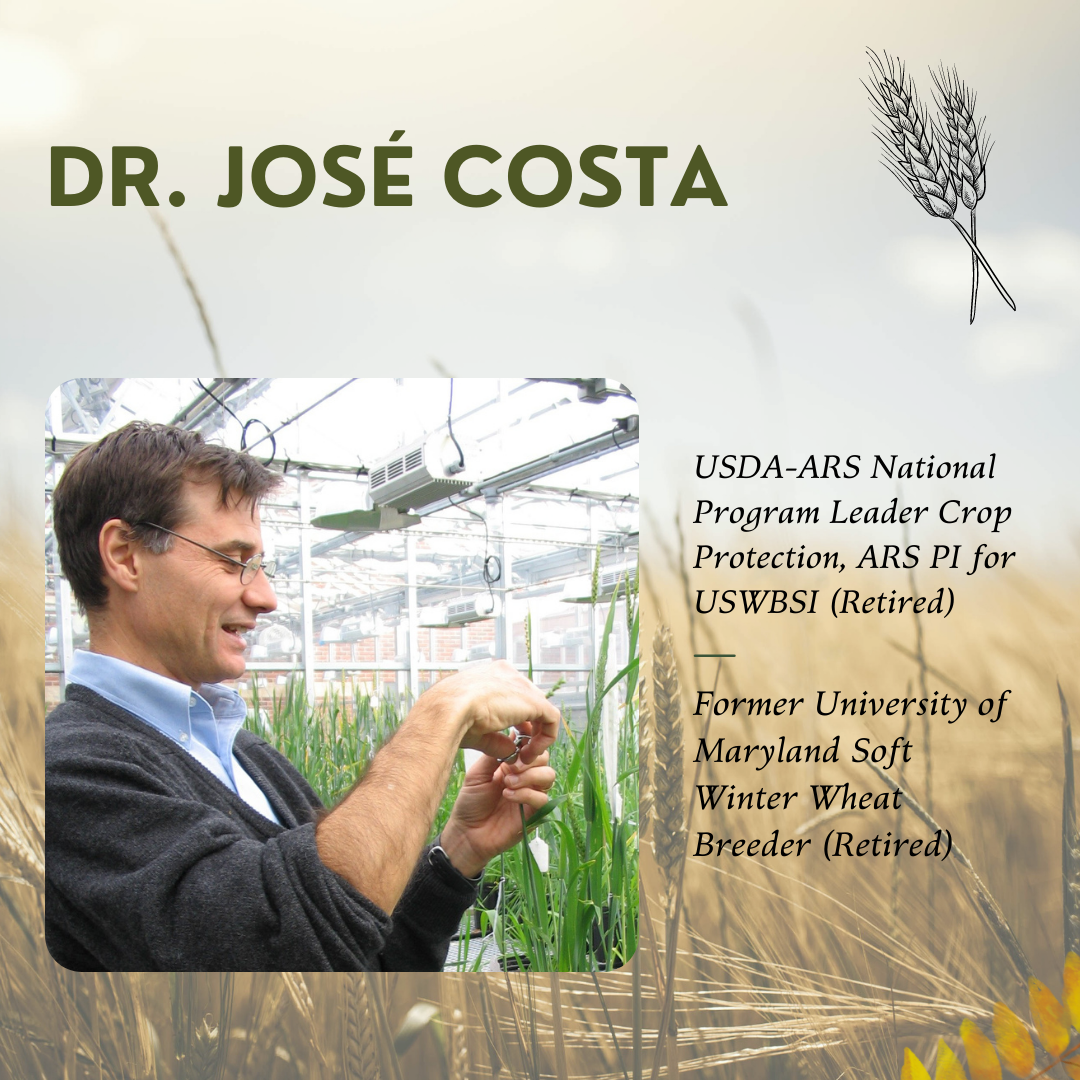Featured Researcher Bio - Jose Costa February 2022

Meet José Costa, Ph.D., recently retired USDA-ARS Crop Production and Protection National Programs Leader, ARS PI for the U.S. Wheat and Barley Scab Initiative (USWBSI), and former University of Maryland soft winter wheat breeder. Costa started as a PI with the USWBSI 22 years ago, in 2000, while leading the University of Maryland’s soft winter wheat breeding program, his projects focused on developing FHB resistant varieties for the Mid-Atlantic region. He then joined the USDA-ARS in 2013 as a national program leader and with those responsibilities became the ARS PI for the USWBSI.
Sentimental Small Grains
Dr. Costa was born in Mar del Plata Argentina and grew up in Lomas de Zamora, Buenos Aires province. He was inspired to study agronomy by his grandfather, Federico Orga, who immigrated from Spain in the early 20th Century to Argentina where he grew wheat and other crops. Visiting his grandfather’s farm as a child encouraged Costa to be involved in farming. He started college at the University of La Plata, Argentina majoring in agronomy and veterinary science. However, due to the example of the 1970 Nobel Peace Prize Winner Norman Borlaug, he chose to stick with agronomy and help feed the world. He graduated with his B.S. in agronomy (engineer in agronomy, a 5-year degree) in 1978.
After graduating, Dr. Costa worked as a wheat breeder for the Institute of Ag Technology (INTA) in Parana, Argentina until 1985. He then moved to the United States to attend Oregon State University. Under the mentorship of wheat breeder Dr. Warren Kronstad, Costa received his M.S. (1989) and Ph.D. (1990) in crop science from Oregon State University. Following graduation, Costa’s post-doctoral mentor Dr. Joyce Loper, a USDA-ARS Hall of Fame microbiologist, taught him key molecular techniques, which at the time were considered novel, but would serve him well throughout his scientific career.
In 1995, Dr. Costa joined the faculty at the University of Maryland. While there, he developed the first public soft red winter wheat germplasm which combined the high resistance to Fusarium Head Blight from the variety ‘Ning 7840’ with the high yielding and high end-use quality traits of soft red winter wheat. Costa retired from the University of Maryland and joined the USDA-ARS as the National Program Leader, ARS Principal Investigator for the USWBSI in 2013. He served in this role for 8 years overseeing the administration of USWBSI funds within ARS.
Memorable Scab Moments
Some of Costa’s most memorable projects with the USWBSI include introducing FHB resistance from the Chinese variety ‘Ning7840’, which carried the Fhb1 gene, into adapted soft red winter wheat germplasm. Additionally, Costa and colleagues crossed Ning7840 to ‘McCormick’ to create an accelerated backcross program with McCormick as the recurrent parent. The progeny from this project were top crossed with the high yielding cultivar ‘Southern States 8641’. Germplasm were tested in the USWBSI Uniform Scab Nurseries and the ARS Eastern and Southern Uniform Nurseries across multiple locations and years. Two lines, MDC07026-F2-19-13-1 and MDC07026-F2-19-13-4 (MDC for Maryland Costa) had some of the highest yields, test weight, end-use quality, and scab resistance in the nurseries. Costa freely exchanged these lines with all the breeders, and they were widely incorporated into soft red wheat germplasm. Costa refers to this story as the “Journey of an Allele (Fhb1) from Gene Bank to Field.”
In addition to breeding, Dr. Costa enjoyed his interaction with other USWBSI scientists including Steven Xu, Guihua Bai, Gina Brown-Guedira, Steve Harrison, and the many others whom he collaborated with to solve FHB. He enjoyed great partnerships with the former Co-Chair, Dave Van Sanford, and current Co-Chair, Ruth Dill-Macky, and his interaction with Sue Canty, the former USWBSI NFO Director of Operations.
Once a Breeder Always a Breeder
While Dr. Costa has recently, December 2021, retired from the USDA-ARS, he plans to continue breeding. He will be moving to upstate New York, where his daughter is starting a flower business. Costa hopes to grow and breed flowers, such as zinnias, calendulas, and dahlias to aid her in this new business venture/adventure. Congratulations on your retirement! We wish you all the best and we thank you for your many dedicated years to the USWBSI.
You can also check out the series of previous USWBSI Featured Researchers.
